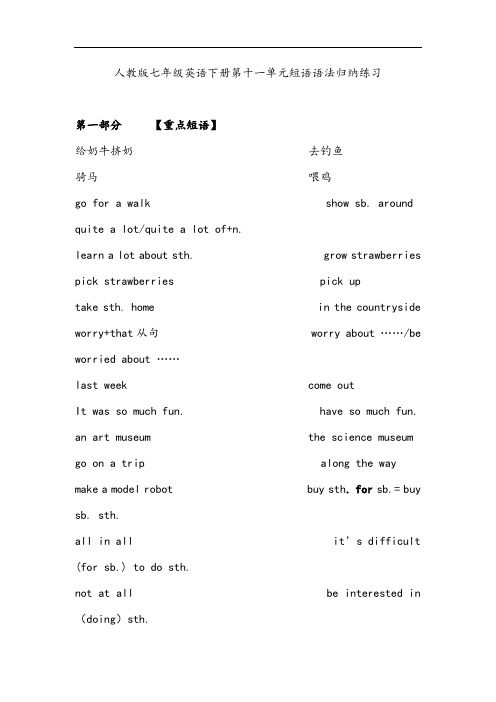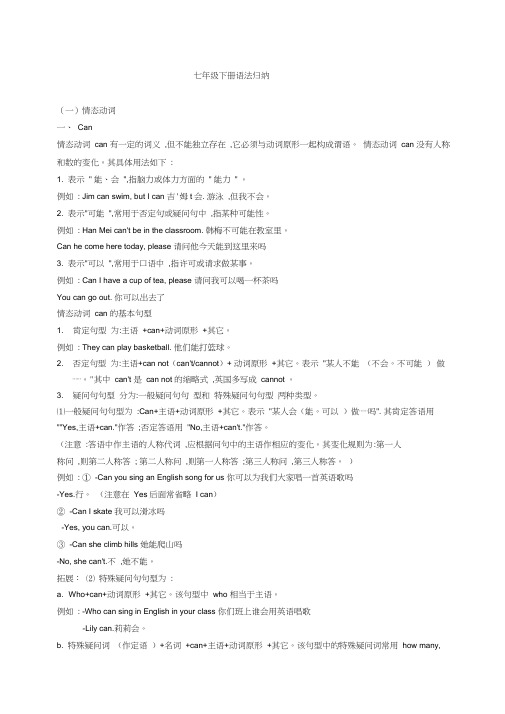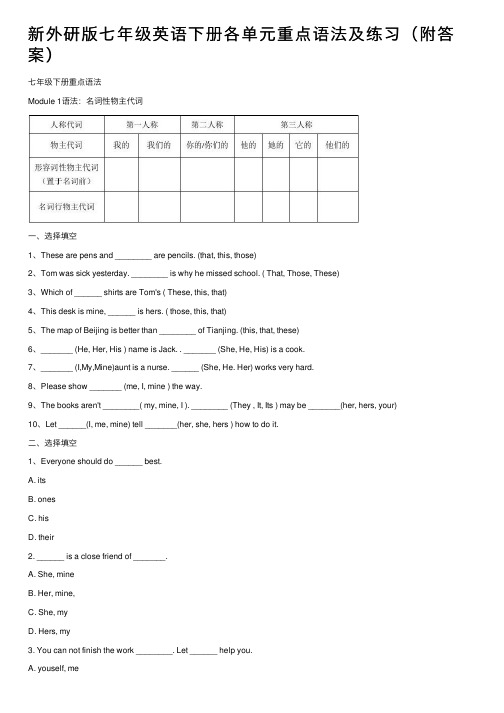七年级下语法讲解及练习题
人教版七年级英语下册:第十一单元短语语法归纳练习(含答案)

人教版七年级英语下册第十一单元短语语法归纳练习第一部分【重点短语】给奶牛挤奶去钓鱼骑马喂鸡go for a walk show sb. aroundquite a lot/quite a lot of+n.learn a lot about sth. grow strawberriespick strawberries pick uptake sth. home in the countrysideworry+that从句 worry about ……/beworried about ……last week come out It was so much fun. have so much fun. an art museum the science museumgo on a trip along the waymake a model robot buy sth. for sb.= buysb. sth.all in all it’s difficult(for sb.) to do sth.not at all be interested in(doing)sth.【答案】从左至右:milk a cow; go fishing; ride a horse; feed chickens; 去散步=take a walk;带领某人参观;相当多的;关于…学到很多;种草莓;摘草莓;捡起/接某人;带…回家; 在农村;担心……; 担心某人某事;上周;出来/出版/开花;如此有趣;玩得非常开心;一个艺术博物馆;科学博物馆;去旅行;沿途;制作一个机器人模型;为某人买某物;总之;对某人来说做某事很困难;根本不/一点也不;对(做)…感兴趣第二部分【重点语法】一、一般过去时1.定义一般过去时表示过去某个时间或一段时间内发生的动作或状态;也可表示过去经常或反复发生的动作。
e.g.I got up at 7:00 yesterday. 我昨天7点起床。
人教版七年级下册英语Unit 1 重难点与语法专项练习题(含答案)

人教版七年级下册英语Unit 1 重难点与语法专项练习题题组训练一speak/tell/talk/say辨析★ speak用作及物动词时,意为“说(某种语言)”,其后常接表示语言的名词作宾语。
如:He can’t speak Chinese.他不会讲中文。
★tell意为“讲述;告诉”时为及物动词,可接双宾语,即构成tell sb.sth/ tell sth.to sb.结构,意为“告诉某人某事”。
如:Tell me your phone number again. = Tell your phone number to me again.再告诉我一遍你的电话号码。
★talk作动词,意为“说话;交谈”,强调交谈的动作,常用于talk to/ with sb.( about sth.)结构,表示“与某人谈论(某事)”。
如:She often talks with her friends about their homework.她经常和她的朋友们谈论家庭作业。
★say表示“说话”时强调说话的内容。
如:She says nothing to me about it.关于这件事她什么也没有对我说。
I.单项选择。
( )1. Please tell her some bread.A. buyB. buyingC. buysD. to buy ( )2. What does Mike in the letter?A.sayB. talkC. speakD. tell ( )3. -Can Mary Chinese?- No, she can't.A.sayB. speakC. tell D talk ★.根据汉语意思完成句子,每空一词。
4.你能告诉我你的QQ号吗?Could you your QQ number?5.下课后,她经常和她的朋友们交谈。
She often her friends after class.题组训练二and/but/or辦析★and意为“和;又”,表示并列、承接、递进关系。
七年级下册一般过去时讲解及练习题

辅导科目:英语授课主题语法:一般过去时教学目标1、熟悉一般过去时的基本结构2、运用概念和结构去解题教学内容经典句型—How was your weekend?—Great,thanks.—What did you do last weekend?-I did my homework.Section A1。
表示“发生在过去的动作",要用一般过去时,句中常含表示“过去"的时间。
一般过去时的结构:主语+V过去式。
翻译时加上“…了”。
(不管主语是“单数”还是“复数”,动词始终用“过去式”)练:(1) He _________ (go)to school on foot yesterday。
(2)– What did Jim do?—— He _________ (go) to the movies。
(3)We ___________ (not go) to the cinema last Sunday。
2. –你上个周末做了什么?—— What did you do last weekend?(did引导,动词还原)——在星期天上午,我打了网球。
—- I played tennis on Sunday morning。
拓展:时间前的介词用什么在上午/下午/晚上:in the morning/afternoon/evening在星期天上午/下午/晚上:on Sunday morning/afternoon/evening在上个星期天上午: / last Sunday morning (前不用冠词)在上学的白天/晚上:on school days/nightson weekends 在周末on weekdays 在工作日3. –Tina的周末怎么样?-- How was Tina’s weekend?--它很棒:It was great。
–它还不错:It was not bad。
–它很糟糕:It was terrible。
人教版英语七年级下册语法归纳习题及答案

七年级下册语法归纳(一)情态动词一、Can情态动词can 有一定的词义,但不能独立存在,它必须与动词原形一起构成谓语。
情态动词can 没有人称和数的变化。
其具体用法如下:1. 表示" 能、会",指脑力或体力方面的" 能力" 。
例如: Jim can swim, but I can 吉'姆t会. 游泳,但我不会。
2. 表示"可能",常用于否定句或疑问句中,指某种可能性。
例如: Han Mei can't be in the classroom. 韩梅不可能在教室里。
Can he come here today, please 请问他今天能到这里来吗3. 表示"可以",常用于口语中,指许可或请求做某事。
例如: Can I have a cup of tea, please 请问我可以喝一杯茶吗You can go out. 你可以出去了情态动词can 的基本句型1. 肯定句型为:主语+can+动词原形+其它。
例如: They can play basketball. 他们能打篮球。
2. 否定句型为:主语+can not(can't/cannot)+ 动词原形+其它。
表示"某人不能(不会。
不可能)做⋯⋯。
"其中can't 是can not 的缩略式,英国多写成cannot 。
3. 疑问句句型分为:一般疑问句句型和特殊疑问句句型两种类型。
⑴一般疑问句句型为:Can+主语+动词原形+其它。
表示"某人会(能。
可以)做⋯⋯吗". 其肯定答语用""Yes,主语+can."作答;否定答语用"No,主语+can't."作答。
(注意:答语中作主语的人称代词,应根据问句中的主语作相应的变化。
其变化规则为:第一人称问,则第二人称答; 第二人称问,则第一人称答;第三人称问,第三人称答。
七年级下册一般将来时复习讲解与练习

感谢您的观看
THANKS
七年级下册一般将来时 复习讲解与练习
目录 CONTENT
• 一般将来时的基本概念 • 一般将来时的语境与运用 • 一般将来时的练习与巩固 • 常见错误与纠正方法 • 一般将来时与其他时态的比较 • 综合练习与测试
01
一般将来时的基本概念
定义与用法
定义
一般将来时是表示将来某个时间将要 发生的动作或存在的状态,常与表示 将来的时间状语连用,如tomorrow 、next week等。
总结词:提高运用能力
在此添加您的文本16字
详细描述:通过填空练习,让学生在实际语境中运用一般 将来时,提高语言运用能力和语境理解能力。
在此添加您的文本16字
总结词:拓展词汇和表达方式
在此添加您的文本16字
详细描述:在填空练习中,可以加入一些常用词汇和表达 方式,帮助学生拓展语言知识,提高语言表达能力。
综合写作练习
总结词
提升写作水平
详细描述
通过写作练习,让学生在实际写作中运用一般 将来时,提高写作水平和表达能力。
总结词
培养逻辑思维能力
详细描述
在写作练习中,可以引导学生思考和组织语言,培 养逻辑思维能力,提高写作质量。
总结词
促进语言实际运用能力
详细描述
写作练习可以让学生在实践中运用语言,提高实际运用 能力和跨文化交流能力。
与过去时区分
过去时表示已经发生的事情,而一般将来时表示尚未发生的事情。例如,“我昨 天去了超市”应该使用过去
03
一般将来时的练习与巩固
填空练习
总结词
填空练习是巩固一般将来时的有效方法,通过填空练习,学生可以加深对一般将来时态的理解和运用 。
完整版)外研版七年级下册英语语法专题复习(含练习)

完整版)外研版七年级下册英语语法专题复习(含练习)XXX的初中英语内部资料,重点梳理了外研版七年级下册的语法知识点。
这些知识点包括词类、时态和句型。
在词类方面,重点介绍了物主代词、情态动词can和方位介词短语。
其中,物主代词表示所属关系,有单数和复数、形容性和名词性等不同形式。
形容性物主代词必须和名词在一起,而名词性物主代词相当于与之相对应的形容性物主代词+名词。
时态方面,重点介绍了一般将来时态和一般过去时态。
在句型方面,重点介绍了特殊疑问句、祈使句、感叹句和选择疑问句。
练题中,需要根据所给句子选择正确的物主代词形式。
11.Mrs。
Green is my teacher。
I am her student.12.That's a cat。
Its name is XXX.1.Mr。
Yang is our teacher。
He is from Beijing。
He teaches us English.2.Look。
there is a cat。
It is Lily's。
Its name is XXX.3.Let me tell her about my life at school.4.This is their room。
Where is ours?5.Don't use the eraser。
It is XXX.6.The lady under the tree is my aunt。
She often sings with her husband.2.XXX of a person or thing to do something.Can has no change in person or number and is followed by the base form of the verb.The negative form is cannot (formal) or can't (informal).XXX:Affirmative: subject + can + base form of verb + other words.XXX.Negative: subject + cannot/can't + base form of verb + other words.XXX.Interrogative: Can + subject + base form of verb + other words +?XXX swim well?Yes。
人教版七年级英语下册:第七单元短语语法归纳练习(含答案)

人教版七年级英语下册第七单元短语语法归纳练习第一部分【重点短语】问天气句型: =How’s it going? How’s everything going?Sounds like have a good timetake a message for sb. tell sb (not) to do sth call sb back No problemsome of my friends I am happy to see yousit by the pool orange juicerelax oneself right nowmy phone isn’t wo rking. talk on the phone write(a letter) to sb just right for +doing take a photo of sb by the pooldrink orange juice study hardon(a) vacation in the mountainsin the rainy weathervisit visitorrelaxed(形容人) relaxing(形容物)Europe European Russian Russiaisn’t working =doesn’t work= is brokensnow snowyrain rainy第二部分【重点语法】1.How’s the weather?= What’s the weather like?询问“天气怎么样?”回答常用:It is + 形容词。
(It’s sunny/rainy/windy/cloudy/snowy)2.How’s it going? 问候语,翻译为“最近怎么样?”也也可以说How’s everything going? 都是询问最近怎么样的意思。
回答常用:Not bad/Great/Terrible等3.Sounds like + 从句“听起来好像……”Sounds like you’re having a good time. 听起来好像你正玩得开心。
新外研版七年级英语下册各单元重点语法及练习(附答案)

新外研版七年级英语下册各单元重点语法及练习(附答案)七年级下册重点语法Module 1语法:名词性物主代词⼀、选择填空1、These are pens and ________ are pencils. (that, this, those)2、Tom was sick yesterday. ________ is why he missed school. ( That, Those, These)3、Which of ______ shirts are Tom's ( These, this, that)4、This desk is mine, ______ is hers. ( those, this, that)5、The map of Beijing is better than ________ of Tianjing. (this, that, these)6、_______ (He, Her, His ) name is Jack. . _______ (She, He, His) is a cook.7、_______ (I,My,Mine)aunt is a nurse. ______ (She, He. Her) works very hard.8、Please show _______ (me, I, mine ) the way.9、The books aren't ________( my, mine, I ). ________ (They , It, Its ) may be _______(her, hers, your)10、Let ______(I, me, mine) tell _______(her, she, hers ) how to do it.⼆、选择填空1、Everyone should do ______ best.A. itsB. onesC. hisD. their2. ______ is a close friend of _______.A. She, mineB. Her, mine,C. She, myD. Hers, my3. You can not finish the work ________. Let ______ help you.A. youself, meB. yourself, mineC. yourselves, mineD. yourself, me4. _______ work is heavy, but ___________ is heavier than _________.A. Our, their, ourB. Our, theirs, oursC. Ours, theirs, ourD. Our, their, ours5. Please take good care of ________.A. youB. youselfC. yourselfD. myself6. Our teacher asked us to enjoy _________ during the summer holidays.A. usB. oursC. weD. ourselves7. He always thinks of others and never thinks of _________.A. himB. usC. hisD. himself8. Music makes ______ relaxing.A. usB. oursC. weD. he9. What's Tom's phone number _____ phone number is 81826753.A. He'sB. HisC. HeD. Her10. Where is your homework I can't find _______ anywhere.A.youB. yourC. yoursD. yourselfModule2语法:情态动词can肯定句结构:主语+can +动词原形+其他.否定句结构:主语+can?t(can not)+动词原形+其他.⼀般疑问句:把can 提前肯定回答: Yes,主语+can.否定回答: No,主语+can?t.⼀、⽤can, can?t填空1. What ______ you do? I can lift this box, but I ______ lift that heavy chair.2. ______ he read Chinese? ——No, he ______ read Chinese, but he ______ read English.3. ______ you stand in front of the door? Then I ______ see you.4. ______ Penny wash the dishes? Yes, she ______ .5. I ______ see some spoons, but I ______ see any knives.6. ______ a cat drink milk? Yes, it ______ .7. She ______ see some cars, but she ______ see any buses.8. Look! This is an invitation. ______ you read it?9. I ______ play the piano and Zhang Peng ______ play football.10. What ______ Mike do at the party? He ______ dance.Module3语法:⼀般将来时be going to+动词原形肯定句结构:主语+be going to +动词原形+其他.否定句结构:主语+be not going to +动词原形+其他.⼀般疑问句:be动词提前——Be +主语+going to +动词原形+其他?肯定回答:Yes,主语+be.否定回答:No,主语+be not.Module4语法:⼀般将来时will肯定句结构:主语+will +动词原形+其他.否定句结构:主语+will not +动词原形+其他.⼀般疑问句:will提前——Will +主语+动词原形+其他?肯定回答:Yes,主语+will.否定回答:No,主语+won?t(will not)注意:be going to 与will的区别1. 表⽰计划到某地去,谓语动词go与going重复,⼀般只说be going to +地点..2. be going to 表⽰⾃⼰打算做某事,计划做某事或有意做某事3. will 则表⽰对未来的猜测⼀、单项选择( ) 1. There __________ a meeting tomorrow afternoon.A. will be going toB. will going to beC. is going to beD. will go to be( ) 2. Charlie ________ here next month.A. isn't workingB. doesn't workingC. isn't going to workingD. won't work( ) 3. He ________ very busy this week, he ________ free next week.A. will be; isB. is; isC. will be; will beD. is; will be( ) 4. There ________ a dolphin show in the zoo tomorrow evening.A. wasB. is going to haveC. will haveD. is going to be( ) 5. -_____ you ______ free tomorrow? - No. I _____ free the day after tomorrow.A. Are; going to; willB. Are; going to be; willC. Are; going to; will beD. Are; going to be; will be( ) 6. Mother ________ me a nice present on my next birthday.A. will givesB. will giveC. givesD. give( ) 7. - Shall I buy a cup of tea for you? -________. (不,不要。
- 1、下载文档前请自行甄别文档内容的完整性,平台不提供额外的编辑、内容补充、找答案等附加服务。
- 2、"仅部分预览"的文档,不可在线预览部分如存在完整性等问题,可反馈申请退款(可完整预览的文档不适用该条件!)。
- 3、如文档侵犯您的权益,请联系客服反馈,我们会尽快为您处理(人工客服工作时间:9:00-18:30)。
名词一.名词的分类:专有名词和普通名词专有名词:人名(Mr Green Mary)时间(September Monday)节日(Teachers' Day Children's Day)机构(the WTO)其它(SARS)国家,地点,第一个字母必须大写,但其中的虚词如冠词,介词等的第一个字母一般不大写the WTO 普通名词:可数名词 a. 个体名词:boy girl ring potato notebook dictionary b. 集体名词people family class team可数名词变复数:a.一般情况下,在名词词尾加-s.清辅音后发/s/,如cats,浊辅音后发/z/ 如bagsB. 以辅音字母s,x,ch,sh结尾的名词,在词尾加-es,读作/iz/ 如buses, boxes, watches, fishesC .以o 结尾的名词,一般在词尾加-s. 如zoos 在有生命的名词的后面加-es,都读作/z/ 如hero potato tomatoD. 以辅音字母加Y结尾的名词,一般先将y 变为i,再加-es.读作/iz/ 如cities, babies, dictionaries,comedies documentariesE. 以f/fe结尾的名词,先将f/fe变成v, 再加-es.读/vz/ 如leaf self thief 也有直接加-S的情况,读/fz/ scarf 两种都可以F, 不规则变化:1. 单复同fish-fish sheep-sheep deer-deer2. 国籍Chinese,Japanese(单复相同) Englishman-Englishmen Frenchman-Frenchmen 其余后面加-s Americans Autralians3. 词尾加-en 或-ren 如child-children ox-oxen4 复合名词复数变化,一般情况把最后的名词变复数,如boy students 含有man 或woman 的复合名词,前后两个都要改为复数形式,如man doctor- men doctors woman teacher - women teachers不可数名词:物质名词是材料、食品、饮料以及固体、液体和气体的物质或化学元素名称water tea air抽象名词主要指一些抽象概念的名称love time weather work health help可数名词的数量:一个苹果二个男孩十个字典不可数名名词的数量:“数词+量词+of+不可数名词”一杯水二瓶茶三袋牛奶二名词所有格1 -'s 所有格:表示有生命的名词的所有格Lily's bag(一般情况下) Teachers' Day(以s结尾)next month's magazine(表时间)Beijing's bridges(表地点)2 of 所有格:表示无生命的名词所有格“the+名词+of+the/物主代词+名词”the window of the(his) room3 -'s所有格和of所有格结合在一起表示的所有关系“of+名词所有格/名词性物主代词”a friend of Lucy's/ mine练习题:一.写出下列名词的复数形式Pencil-box_______leaf____Sunday______city_____dress_____ match____zoo___exam______tooth_____foot_____Japanese________Enlishman____ 二.翻译下列短语或句子八杯水________________ 三筐橘子_____________ 一个小男孩的名字_____________ 五小时的路程______________四名美国女教师_____________________ Jim 和Kate 的妈妈____________________ 桌上有一条裤子_______________Tom叔叔是我爸爸的好朋友。
_________________________________________________________三.用所给词的适当形式填空1. I have a lot of______(homework) to do every day. 2 Some______(child) are flying___(kite) near the river.3. It is the best one of the_____(photo) in my family.4. Are they building any____(library) in the city?5. After three_____(month) study, the scientists worked out the physics problem.6. Here is a card for you with our best____(wish).7. There're different______(fish) in the sea. 8. Could you tell me how many_______(boy student) were at the party?9.This is a _______(visitor) car. Mine is over there. 10. This is _____(Anne and Jane) bedroom. The twin sisters like it very much.4.11. I'd like_______(two shoe) for my twin daughters.11.---Where do you come from?-----I come from_______(Japanese).I'm an_______(America).12.The Sams ___(be)going to Beijing with my family. 13. Both my father and my brother are _______(police)14. Help yourself to some ________(fish),please. 15. What's you favorite______(sport) star?17. Come and buy your_______(cloth) at Huaxing Clothes Store. 18. He is__________(30 year old),he has a ____________boy.(5 year old)19.__________(Lucy and Lily) fathers are teachers. 20.People in the part__________(have) a great time now.四.单项选择1. Swimming is ________in summer. A a great fun B great fun C great funs D great a fun2. I often have______or________for breakfast. A. breads; noodles B. bread; noodles C. breads; noodle D. bread; noodle3.-----Excuse me, is the supermarket far from here? -------No, it's about________A 7-minutes walkB 7 minute walkC 7 minutes' walkD 7 minute's walk5.There are two________ in the city. A car's factory B car's factories C factories of cars D car factories6._______ is nice and clean. A The air today B The today air C The air of the today D The today of air7.This computer is _______. A my brother B my brothers C my brother's D my8.Put on your________quickly. A a cloth B the clothes C cloth D clothes9.He told me________would come to his birthday party. A. Many Jack friends B. Jack's many friends C. Many Jack's friend D.many friends of Jack's10.The letter from my uncle was short. There wasn't ______news. A. many B. a few C. much D. Few代词:人称代词、物主代词、反身代词、疑问代词、不定代词、复合不定代词、代词it、相互代词:one another / each other(互相)一.人称代词 a 主格:I / you / he / she / it / we / you / they 在句中作主语。
I am a student.b 宾格:me / you / him / her / it / us / you / them 在句中作宾语或表语。
He teaches us English.二.物主代词 a 形容词性my / your / his / her / its / our / your / their 在句中作定语,修饰名词My cousin is beautiful.b 名词性mine / yours / his / hers / its / ours / yours / theirs 相当于“形容词性物主代词+名词”用来避免和前面已提及的名词重复It's not Li Lei's book. It's mine. I did my homework myself. I did it by myself三.反身代词myself / yourself / himself / herself / itself / ourselves / yourselves /themselves在句中作同位语,加强名词或代词的语气“亲自,由自己”四.疑问代词:who / whom / whose/what/which With whom did you go to school?(whom作宾语) Whose pen is this?Which color do you like best? 五.不定代词:some / any / many / much / both / all / each / every / other / another / others / the other / the others六.复合不定代词someone,somebody,something;anyone,anybody,anything;everyone,everybody,everything;no one,none,nobody,nothing七.代词it 1. 指代前面提到过的事物。
